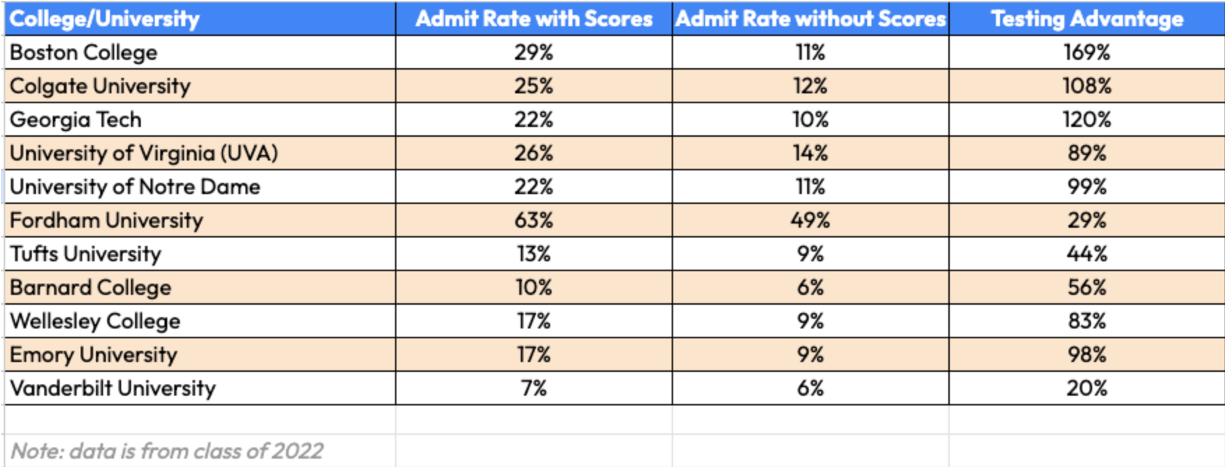Give your student a clear, strategic edge with a test prep plan designed by Adam Allouche, ESM Prep College MatchPoint’s Director of Test Prep. In this customized strategy session, Adam—a world-renowned SAT and ACT expert—will develop a detailed roadmap to align perfectly with your student's needs, ensuring that every prep hour is purposeful and geared toward maximizing their scores. With years of experience mentoring students at top-tier schools worldwide, Adam’s approach emphasizes precision, balancing academic review with targeted strategy to streamline preparation and build confidence. Free up your time while giving your student a plan that’s proven, personalized, and designed for competitive results—schedule a session with Adam today and set him on the path to success!
Test-Optional ≠ Test-Ignorant: The Real Impact of SAT/ACT Scores in a Test-Optional World
In recent years, test-optional policies have gained momentum, offering students the option to apply to college without submitting SAT or ACT scores. While this flexibility has been welcomed by many, it’s important to remember that “test-optional” doesn’t mean “test-ignorant.” For students aiming to attend top colleges, submitting strong standardized test scores can still significantly enhance their chances of admission.

Even at colleges where SAT/ACT scores are optional, submitting strong test scores can significantly boost your chances of admission. Looking at data from students who applied during the 2022-23 admissions cycle:

Give Your Student the Competitive Edge with a
Custom SAT/ACT Roadmap
This data clearly demonstrates that submitting test scores can provide a significant advantage. At Boston College, for instance, students who submitted SAT or ACT scores were admitted at a rate of 29%, compared to 11% for those who didn’t. Similarly, at University of Virginia (UVA), students who submitted test scores had a 26% admit rate, versus 14% for those who chose not to submit. The trend is consistent across other top schools: test-optional does not mean test-irrelevant.
University of Texas at Austin: A Data-Driven Approach
The University of Texas at Austin (UT Austin) provides valuable insight into how test scores impact admissions and future performance. In Fall 2024, 42% of applicants submitted SAT or ACT scores, and these students had a median SAT score of 1420 compared to 1160 for those who did not submit scores.
But the impact of submitting test scores extends beyond admissions. Among UT Austin’s 9,217 first-year students enrolled in 2023, those who submitted test scores performed better academically during their first semester, with an average GPA 0.86 points higher than those who did not submit scores. These students were also 55% less likely to have a GPA below 2.0 in their first semester. This data reinforces the importance of standardized tests, not only in gaining admission but also in predicting college success.
University of Virginia: Test Scores as a Strategic Advantage
At UVA, submitting test scores can give students a competitive edge, especially those from high schools with less rigorous academic programs. Admissions officers recognize that strong SAT or ACT scores can demonstrate academic potential that grades alone may not fully capture. Students applying to selective institutions like UVA are more competitive when they submit strong test scores, which help admissions teams evaluate their preparedness for the academic rigor of college.
The Role of Test Scores in Merit Scholarships
It’s not just about admissions—submitting test scores can also impact financial aid opportunities. Many colleges, including Boston College, use SAT and ACT scores to determine eligibility for merit-based scholarships. Students who choose not to submit scores may miss out on significant scholarship opportunities, which can make attending a top school more financially feasible.
In a test-optional world, test scores remain a key component for accessing both admission and financial aid advantages. For families aiming to balance the cost of college, submitting strong test scores can open doors to valuable financial support.
Test-Optional ≠ Test-Ignorant
Despite the growing number of test-optional policies, top colleges and universities continue to value standardized test scores. Schools like Yale University, Georgetown University, and Cornell University have shared data reinforcing the importance of test scores. At Yale, students who submitted SAT or ACT scores were admitted at a rate three times higher than those who didn’t (6% vs. 2%). At Georgetown, 90% of accepted students submitted test scores, even though the school has a test-optional policy. Cornell found that submitting test scores significantly increases the likelihood of admission, even when controlling for other factors like GPA, essays, and extracurriculars.
In today’s test-optional world, it’s easy to assume that SAT and ACT scores don’t matter anymore. However, the data paints a different picture. Submitting strong test scores can still provide a meaningful advantage, whether it’s for admissions, merit scholarships, or future academic success. These examples highlight that, while test-optional policies offer flexibility, submitting strong scores can make a significant difference in a competitive admissions landscape.



